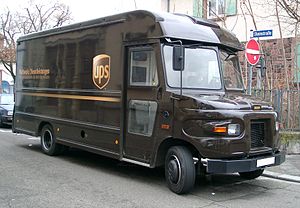| UPS-Truck (Photo credit: Wikipedia) |
In truth, that article just threw down the gauntlet of how and why Louisville must prepare for the future, because that which makes us wealthy now will not persist.
The advent of 3D printing will decimate the logistics industry just as surely as the advent of the Internet decimated the content publishing industry. If Louisville is to survive the next-thirty-years' shift from centralized to distributed bespoke manufacturing, we need to position ourselves now.
Don't let the wildly misunderstood panic about 3D-printed handguns distract you from what is really coming in 3D printing. There are two phases to the coming industrial revolution. The first is bespoke production.
Perhaps the best example from recently headlines have been the custom-created action figures that let you put your face on a Star Trek or Star Wars toy. These are unique items designed specifically for you, but in a centralized manner. For a time, at least, these concepts will still benefit from centralized production and conventional logistics.
This sort of bespoke production will expand into other industries, such that I won't buy an off-the-rack t-shirt any more, but every item I get from ThinkGeek or Eddie Bauer is tailored to fit me. (Celebrities already do this with conventional clothes and traditional tailors; bespoke production will bring this advantage to everyone.) Low-end commodity items may not move there very quickly, and these items will continue to benefit from economies of scale, but the shift will be in general away from small-medium-large commodity sizes to personalized fits. Wal-mart may be fine, but Mall St. Matthews should be worried.
There will be an interesting status-consumption trend away from generic sizes, where only the poor (and hipsters) wear off-the-rack, though I expect Big Data will offer at least a short-lived backlash of wide-variety mass-production styles. If analytics can introduce 13 new positions for basketball players, they can certainly invent something better than Size 10 and 34-C, with a wider permutation of sizes and shapes to accommodate a wider variety of body types.
All of this will still leverage centralized production and logistics, but it's just a the first wave of a greater change.
The next and more permanent phase, and the one that will kill modern logistics, is decentralized production.
Rather than run off estimated lots of cheap, generically-sized goods in big factories and then ship them, just in time, to consumption points, we'll sidestep nearly all of the supply chain and fabricate consumer goods ourselves at or close to home. Furniture, clothing, and even food will be custom-produced to our exact needs: a jacket that fits perfectly (especially considering the extra five pounds you gain during the holidays, the time of year you wear it the most), a bookshelf that fits precisely behind that weird-sized door in the spare bedroom and has shelf heights tweaked for your carefully curated physical scrapbooks, and even tank-grown meat with just the right fat percentage, thickness, portion size and mineral content that it grills to medium rare exactly when and how you like it.
You'll pick all of it up at local bespoke producers or synthesize it at home in your kitchen or craft room. (Indeed, some form of workshop may be the new must-have home venue that complements the yuppie requirements of a mud room, home theater and yoga studio.)
It sounds like science fiction, but ask the dwindling number of employees down at the Courier-Journal how it feels for the "that will never happen" crowd running your industry to be proven horrifically wrong. We have robot cars with laser cannons on Mars, actual Star Trek tricorders available for purchase and we're printing organic lung splints like we're Bones McCoy. Heck, the present looks more like classic Star Trek than the new Star Trek movie and you think there's a future in an industry based on moving boxes around airports?
UPS has been very good to Louisville and should be praised for it. We probably have another 20-30 years of good times on that gravy train, which means I'll retire in the warm glow of the WorldPort but my daughters will hit career-prime just as the bespoke revolution guts the Derby City economy.
The bespoke future is coming. We can make the moves to own it now, or be caught looking when somewhere else becomes the bespoke development capital of the world. Louisville is perfectly positioned to become a bespoke epicenter precisely because we're a logistics hub that can thrive during the adolescence of this industry. We can ride the wave of 3D printing and all it entails, or be drowned by it.
I, for one, plan to learn to surf.


No comments:
Post a Comment